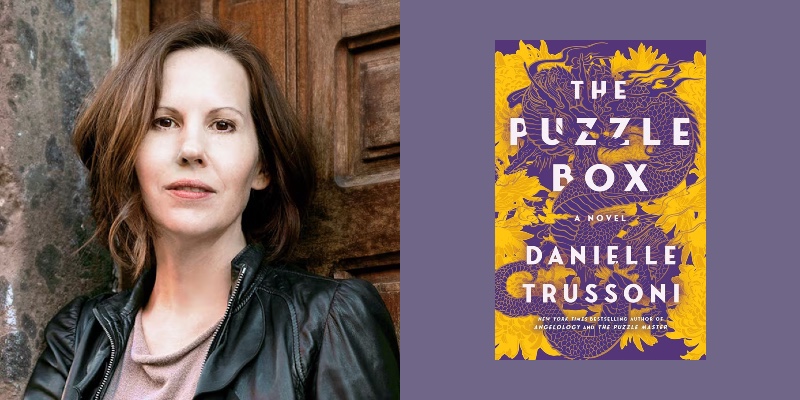Readers can be forgiven if they think after reading The Puzzle Box—and its predecessor The Puzzle Master—that Danielle Trussoni is puzzle obsessed. She’s not. What drives her fiction, though, is the same pursuit for understanding how it—meaning life—all fits together. And we’re lucky she’s on that quest, because The Puzzle Box is a wild ride into a high-stakes world of deadly puzzles, ancient secrets and epic sibling rivalry.
Nancie Clare
You are a memoirist and a novelist; the subjects that you write about center around the search, the odyssey, the quest for secrets, for clues, for solutions and for self. Is that an accurate way of looking at your work before we talk specifically about The Puzzle Box?
Danielle Trussoni
That’s such an insightful way of looking at my body of work. It’s something that I’ve thought about a lot lately, now that I have seven books that are published. Seeing them all together on the shelf, it’s like “what connects these things?” And this is a roundabout way to say that I started writing because I needed to understand my family. My first book is a memoir about my relationship with my father who was a Vietnam vet. It was all about family secrets and the things that were hidden and who I was and who he was and how trauma and history affected the present. If I look at my novels, are there secrets, history, how they affect the present, uncovering them, and a kind of quest, as you said. And so I think that structures the memoir that I wrote, and it also structures all of my novels.
Now, one thing that was really important to me after I wrote that first book was that I didn’t want to write the same book over and over again. I decided after publishing Falling Through the Earth that I was going to write something very, very different, and Angelology was very, very different. But now that you point this out—and when I look at the collection of books that I’ve written and the patterns and archetypes—all of those things were there: historical influences on the present and the quest with a little bit of religious influence because I was raised very Catholic. I went to a Catholic school. In the fifth grade, there was a school shooting where the priest and two other people were murdered. And so that violence, that sort of mixture of religion and violence and growth, became wrapped up in my work.
Nancie Clare
In your acknowledgements, you give a shout out to Dan Brown, and at one point the central character of both The Puzzle Master and The Puzzle Box, Mike Brink says, “this isn’t a Dan Brown book”, and I agree, they are very much not Dan Brown books.
Danielle Trussoni
Really not!
Nancie Clare
At most there’s a similarity to Dan Brown in the quest aspect of the stories: following a trail of clues towards a conclusion, which I guess could be something you could say about all crime fiction.
Danielle Trussoni
Sure. I thought it was really interesting because when Angelology, my first novel, was published—and that was probably my most widely read book—I would be asked over and over about how Dan Brown influenced me. And at that point, I had never read Dan Brown! There’s all this stuff about angels and demons and the supernatural and various quests and stuff. That was something that really came from, to be quite frank, the Bible, my religious upbringing, and reading lots of 19th century fiction, Wilkie Collins and those kind of detective novels. It’s a little bit of a coincidence that there was any overlap between Angelology and Angels & Demons. I ended up meeting Dan Brown and became a friend of his. I could understand why that comparison was made. But I think while there are similarities in themes and similarities in structure, the tone is so wildly different that the books really can’t be compared. And he’s told me the same thing. We both agree about that.
Nancie Clare
Puzzles and their solutions—often with high stakes for the person answering the questions—run through mythology. I mean, let’s just talk about Odysseus and The Odyssey and The Iliad, characters are always having to answer questions from the Sphinx or go through a labyrinth—and if they don’t succeed, they’ll die. What is it about these stories: quests with seekers that often have extraordinary skills that is so addictive to humans?
Danielle Trussoni
I agree, I think there’s something deeply, deeply satisfying about being posed a question, being posed a riddle, and then bringing the reader through it and solving it. And if I even take that one step farther, I think of writing a novel to be that exact setup, right? We have a premise, and we have something that the characters want to know. And the entire novel, through emotional stakes, through relationships, through secrets and through adventures become this wonderful experience of solving it. All fiction has that in common. That’s why I’m drawn to fiction and why I write fiction, and it’s why I’m especially in love with crime fiction and thrillers, because that’s right out on the surface and it’s very clear.
And I would just add that that’s what living is, right? We are here without answers. We’re born without any sense of what the larger answer to this existence is. And so being able to condense it and boil it down into a sort of essential question in a novel makes life graspable in some way, in a small way for a couple of hours.
That for me is the beauty of fiction in general, not just crime fiction and thrillers, but every kind of reading. I would say that for me, it’s a larger existential question of why I write and why we read.
Nancie Clare
Let’s talk about your protagonist, Mike Brink, both in the The Puzzle Master, where you introduced him, and the current novel, The Puzzle Box. Mike’s a young man who suffered a traumatic brain injury in high school that led to acquired Savant Syndrome, which is a real thing, rare but real. And in Mike’s case, it manifests as making him a puzzle master extraordinaire. I remember when I read the first book, as appealing as the syndrome might sound—as in like, who wouldn’t want to be a genius—it is a neurodivergent condition and can be devastating for the person who has it. So these two elements—puzzle master and acquired Savant Syndrome—where did they come from and how did they get molded together?
Danielle Trussoni
In the beginning, Mike Brink was just really smart. I had written a draft of The Puzzle Master, and at one point the character of Jess Price and the cipher that she draws in prison was more prevalent. She was a bigger character than Mike Brink. But when he came into the novel, when I started developing the person who solves that cipher, I realized that this was a huge possibility narratively, to have someone who was something of a genius and could go through the novel and solve it and go deeper into what this mystery was about. I started from a point of not knowing anything about Savant Syndrome or even puzzles. Really, I am not a puzzle expert myself, and I’m not particularly good at them. I like the crossword and I love Wordle, but that’s about it.
I started doing a lot of research about genius, and I stumbled across a book by a man named Dr. Treffert who had an institute in Wisconsin where he helped, counseled and worked in various ways with savants. I read about acquired Savant Syndrome, and I was like, this is completely incredible. If the human brain, after having some sort of traumatic brain injury can overcompensate in a way that allows it to do things that it couldn’t do before, what does that say about human consciousness? And it just took me into this whirlwind of questions. And for me, when I hit a point like that with a character, I know that’s a character I want to spend time with.
I went back in the novel and revised it and made Brink much more prominent, and I really explored the damage [Savant Syndrome] can do. I think that in The Puzzle Box, it’s even more apparent that Mike is suffering. The idea that, oh, yeah, I would love to be able to have an eidetic memory, and I would like to be able to read a novel in five minutes and remember everything. That seems nice on paper, but the chaos that this character lives with and the need he has for order and stability is really, for me, the most compelling part about that character.
Nancie Clare
And the compulsion to complete puzzles. Mike acts against his own self-interest; he will put himself in danger to solve a puzzle…
Danielle Trussoni
Kind of like being a writer! When I started writing, I was very aware that it was not the best career choice, not the most stable, that I may never make a penny doing it. It was just pure addiction and love of the act of writing and of books that brought me into it.
Nancie Clare
Mike vacillates in how he views his condition: sometimes a gift, sometimes a curse. It makes him ripe for exploitation by people with bad intentions—and not just people, because I want to talk about Jameson Sedge, who manipulated Mike into solving an ancient mystery before Sedge uploaded his consciousness and killed himself at the end of The Puzzle Master. The idea of uploading your consciousness into an external neural network like he did, I don’t even know what the nomenclature would be, makes him a formidable enemy because now Sedge is nowhere in everywhere, and that’s a little like God,
Danielle Trussoni
Which is the problem with a villain like God. Right? But it’s also the manifestation of one of my biggest fears about technology. I know I am not the only person in the world who’s afraid of what AI can do. Companies have essentially trained their AIs on our books that were pirated without permission and without compensation. And there’s nothing we can really do at this point; it’s very frustrating. And for me, this is my nightmare as a writer—something I love to do and that I’ve dedicated my life to learning how to do well is going to suddenly become irrelevant. I personally don’t think that readers will ever be happy with AI generated books, but still, it’s terrifying. And it’s something that I think about for Jameson Sedge, who’s this sort of godlike and devil figure, he’s the ultimate hero. And for me, my challenge as a writer was how do you limit something, a creature or a person like AI? I don’t know if that makes sense, but there’s nowhere to go with an all-powerful villain. So Jameson does have an arc, and he is going to change in the next book. And even in this book, he is not all powerful…
Nancie Clare
Jameson no longer has a corporeal presence. He makes that point in at the end of the first book, saying: I have no body, I can’t eat dinner, I can’t drink wine, I can’t be with my girlfriend, but I’m everywhere. Anywhere there’s an electronic surveillance device or a phone, I can be with you. I have to say, that’s my nightmare: being watched and followed.
Danielle Trussoni
Yeah, me too. It’s terrifying. And we don’t even realize how far it could go, because we rely so heavily on technology. It’s part of every element of our existence. In my imagination, something like Jameson is a really terrifying villain. And having him be the primary force that Mike Brink is up against, makes this a kind of, I don’t want to say epic, but the stakes are very, very high.
Nancie Clare
This is about…
Danielle Trussoni
The future. Who can control and destroy all of us? Jameson Sedge is that big.
Nancie Clare
In The Puzzle Box, Mike Brink is invited to solve a legendary puzzle. Every twelve years since the mid 19th century—in the year of the dragon—an attempt can be made to solve the dragon box puzzle. And the stakes are high because the puzzle box contains deadly booby traps. You’ve really set up this really high stakes, I don’t even want to use the word game, but it is a bit of a game. And where did that come from? How did an Asian tradition filter in?
Danielle Trussoni
I lived in Japan in my mid-twenties for two and a half years. I was an English language instructor in a high school in rural Japan. I fell in love with Japan quite literally. I learned how to speak Japanese a little bit, and I really immersed myself in the culture. I learned calligraphy. But another element that was really attractive to me then—I am not a Catholic now— was the idea of spirituality without Western religion. I went on Zen retreats, and I did a lot of meditation. I also became fascinated with the history of Japan. After I went back to the United States, I carried that with me—that kind of spirituality stayed with me. It still is with me. It’s very much part of my life.
Nancie Clare
But it’s not just the puzzle, not just the potential for death in trying to solve this puzzle through booby traps of poison, explosions, losing digits. Mike Brink has adversaries in both the real and virtual worlds. In the virtual world, it’s Jameson Sedge. In the real world, it’s two sisters, Sakura and Ume. Could you talk about them? Because I found them fascinating. I really found that sort of light-dark, ying-yang duality with those two.
Danielle Trussoni
I love those two. I don’t know if you recall, but Ume has a cameo in The Puzzle Master. She was the one who taught Cam, [Jameson Sedge’s right-hand man] how to fight, and she was Jameson’s head of security.
And when I wrote her then I was like, oh, I love this character. I really love her. And when I was writing The Puzzle Box, I knew I wanted her to be a part of it. It all started with Ume; she was the grounding force of that. The idea that she was connected to historical tradition of the Samurai, the onna-bugeisha they’re called, which were female members of Samurai clans. And from that relationship of Ume to her past and her relationship with Sedge came this idea of what would happen if she had a sister who just rejected all of it, who was modern and had her own path in life?
I think you’re right when you say that between light and dark. Ume was a character that I loved in The Puzzle Master, and then Sakura became my favorite character in The Puzzle Box. And those two sisters are both very strong in their own ways, and they represent more of more than just light and dark. I think that they represent the idea of a cerebral strength and a physical strength because Ume is very physically powerful and controlled in her body, whereas Sakura is very much in control of her mind. And those two differences are really interesting to me, especially in the world that I created with Mike Brink, where his mind is both this wonderful tool that he can use, but also something that really harms him physically.
Nancie Clare
You have another female character that I’m intrigued with, and that’s Rachel Appel. She helped Mike with the God puzzle, which is from the Jewish tradition of Kabbala, in The Puzzle Master and she’s back in The Puzzle Box.
I find their relationship to be interesting because it’s not romantic, and interesting because Rachel’s a believer in the divine. And Mike strikes me as a non-believer, which doesn’t preclude him from being in touch with the spiritual, of course, but I don’t think he believes in the same way Rachel does.
Danielle Trussoni
I see Mike and Rachel as empirical and spiritual. Mike puts faith in his brain and his ability to solve things. He’s a graduate of MIT, and his circle of mentors and friends are scientists and statisticians. Rachel, on the other hand, is a scholar and someone who studies the history of religion and religious texts. She very strongly believes that there’s a higher purpose and that things are connected in a spiritual way. Their relationship for me is a kind of Scully-Mulder relationship. It is this nice dichotomy where the two of them genuinely care about each other. And Rachel is a little bit in love with Brink.
But she’s also a bit afraid of moving beyond what they have because she sees that Brink might not be able to handle that, and it might not work. I really loved doing the research to create her in The Puzzle Master, because she’s a scholar of biblical texts, and I didn’t know anything about that. So doing the research to understand her and her work was very, very intense. I spoke with a lot of people, I spoke with Kabbala scholars and read many, many books about the things that she would think and say!
Nancie Clare
Let’s talk a little bit about writers and research and the rabbit holes that they can dive into. You mentioned it earlier when you talked about Mike Brink, where you said you wanted to make him just a really smart dude, and then you started researching. And it is amazing what can happen…
Danielle Trussoni
Completely! Suddenly your book is something that you had no idea it was going to be. For me there’s a danger that I can get too drawn into the research and too fascinated by certain elements and let it take over. So, it takes some discipline. There were many moments in The Puzzle Box when I could see going off on a different direction, and I didn’t, which is the beauty of writing a thriller, you have a structure that you can go back to, and you’re not going to get pulled into those rabbit holes as deeply.
Someone once asked me, “why do you write thrillers?” And I think that that’s why, because that structure and that propulsive movement of the plot really helps me to stay on track, and not just sort of go off on a tangent and find myself with a hundred pages about some ancient riddle that I think is very cool, but other people might not care about.
Nancie Clare
I would be remiss if I didn’t mention Conundrum, Connie for short, Mike’s dachshund. I got to say, I love when a dog is part of a story, but I have anxiety while I read, because I’m always worried about the dog.
Danielle Trussoni
I had readers write to me a third of the way through The Puzzle Master and say, if anything happens to the dog, I’m showing up at your house. People are really, really attached to Conundrum. Me too personally.
And this is a little bit a fun fact: The Puzzle Master was published last year, and then for my birthday, my husband bought me a dog that is exactly like Conundrum. She’s a rescue. So now there’s a real Conundrum in my life.
Nancie Clare
The point of the suspension of disbelief on the part of the reader is the tipping point for a thriller. Do you think about that point? How to make sure the reader going to come along on this ride?
Danielle Trussoni
Totally. I think that I got right up to the edge more in The Puzzle Master with that. And I think that there were some versions of that book where maybe readers would, if I had left it the way it was, would be like: I’m not with you there with all the stuff that happens with the Kabbala and with AI. It took many, many drafts to get to the point where I felt like I was walking that line. This is why I think the research is important, and going down those rabbit holes that hours later, you come up and you’re like, oh my goodness, where am I? It’s having the scaffolding that the research, the historical information and the world building that supports those moments where there’s a kind of flight of fancy that is: whoa, I didn’t see that coming! Having all of that in place allows a writer to do that. And so that’s why I think I take so much care and so much time to do the research. But that said, hopefully, I think The Puzzle Box has fewer moments like that because the premise of the box—and the reason that the box was made—is really what people have to buy into.
Nancie Clare
I bought it!
Is there anything that I missed in our discussion? Is there anything you’d like readers to take away from The Puzzle Box or take away from the story of your characters? What have I missed?
Danielle Trussoni
I’m thinking about it. I think you covered everything…
Nancie Clare
That would be a first!
Danielle Trussoni
One thing that I’m really going for with The Puzzle Box, and that I worked hard to achieve, is that I want readers to feel like they’re on a fun adventure to get lost in. And one of the most gratifying things for me is when a reader writes to me and says, “I’m Googling things, and some of these things are true, and some of these things are not true, and I can’t tell which is which. Did these things happen?” And ability for readers to get lost and to just put aside reality for a while, and the seriousness of life is really enjoyable for me and gratifying.

















